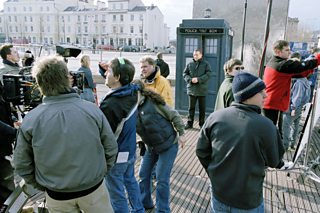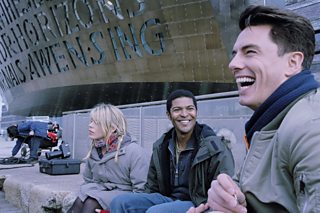What Doctor Who did for television production in Wales
Rhodri Talfan Davies
Director, ΒιΆΉΤΌΕΔ Cymru Wales
Tagged with:
In television, as in any other major industry, there are defining moments. Moments that capture the imagination, that open everybody's eyes, moments where just about everything seems possible.
The revival of in 2005 was one such moment. Alongside its popular and critical success, the revival of this sci-fi classic transformed perceptions of the television sector in Wales.
For years, we'd struggled to make an impact on UK network screens, but with the TARDIS in town suddenly everything really was within our grasp.

Shooting on location in Cardiff for the first series of Doctor Who.
To be fair, there was some good drama being made in Wales before the Doctor - but it was limited and sporadic. Network commissioners at the ΒιΆΉΤΌΕΔ tended, if pushed, to favour projects that chimed with some of the clichΓ©s of Welshness.Β You know the stuff β the choirs, the sheep, the miners, the tall hats.
But the launch of Doctor Who in 2005 changed all that. And for one simple reason. It created a confidence and belief that Wales could deliver.
Looking back now, my predecessor Menna Richards took a real gamble. Everything hung on the seriesβ success. She recognised that, of course. And she gathered some extraordinary talents around her β including one Russell T Davies and executive producer Julie Gardner β to lead the charge.

Billie Piper, Noel Clarke and John Barrowman on location in Cardiff during filming for series one of Doctor Who in 2004.
Success was by no means assured. We had audience research back then that told us there wasnβt much interest in seeing the old series reborn. But research can be wrong, and this time it was very wrong.
With Doctor Who, the commissioners could see Wales delivering with a confidence and impact that they'd never seen before. And in the TV business that opens doors, it creates new possibilities. It means commissioners ring up and ask, βWhatβs next?β
The transformation was remarkable. And the vast production machine of Doctor Who sprinkled its magic dust everywhere. Some of the foremost independent producers in the field β companies like Shine who produced and Hartswood who produce β opened bases here in Wales. ΒιΆΉΤΌΕΔ Wales also seized the opportunity: was moved to Cardiff and a giant production centre was built at in Cardiff Bay.
This clustering effect helped to transform the skills base in South Wales. And perhaps for the first time ever, the brightest talents in Welsh drama production now had the chance to forge their careers in Wales without having to weigh anchor and set sail for London. On productions like , , ,Μύ, the new S4C/ΒιΆΉΤΌΕΔ production (shot in both Welsh and English) and many others.
The result is that Wales is home to some wonderful talents. People like ΒιΆΉΤΌΕΔ Wales dubbing maestro Tim Ricketts who has been a permanent fixture on every Doctor Who episode since 2005. Or production designer Arwel Wyn Jones who's led the design teams on Sherlock, and Wizards vs. Aliens. Or Nikki Wilson β who joined ΒιΆΉΤΌΕΔ Wales in a development role, then took the reins as series producer of Casualty, and is now producer of Doctor Who.
These are all people, and talents, who would have been lost to Wales β but now they are able to stay here, to make their mark here, and to inspire another generation. It is all part of the extraordinary Doctor Who story. And I'm certain the best is yet to come.
is the Director, ΒιΆΉΤΌΕΔ Cymru, Wales
- Read Jon Jacob'sΒ Β 'Why the Doctor Never Dies' about how the show inspired a generation of media professionals.Β
- Read interviews with the cast and crew of Doctor Who: The Day of the Doctor on the . The 50th anniversary story is broadcast on Saturday 23 November 2013 at 7.50pm.
- Mark Gatiss' airs on ΒιΆΉΤΌΕΔ Two and ΒιΆΉΤΌΕΔ HD on Thursday 21 November at 9pm.A is available on the official .
